David Moores, former chairman of Liverpool Football Club, passed away on Friday, July 22, at the age of 76, just weeks after the death of his wife Marge.
Though often criticised for the sale of the club to Tom Hicks and George Gillett, there can be no doubt that Moores had a lifelong and deeply held love of Liverpool Football Club and its supporters.
Moores was the last of his kind, a millionaire fan, brought up in a wealthy Liverpool family who went on to own the club he loved. Today’s football owners are oligarchs, sovereign states and consortiums. The clubs they control are more often than not vanity projects, vehicles for sports washing and investment opportunities. For the Moores family, rooted in the city, owning Liverpool Football Club was a labour of love.
Fufilling a dream
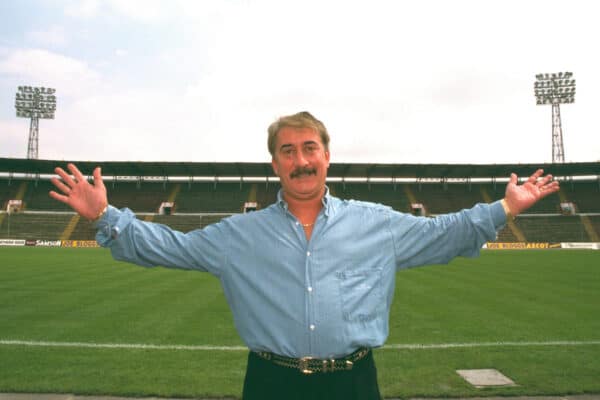
The Moores had become one of the richest families in the UK thanks to their creation of the Littlewoods football pools empire, which sold for £750 million in 2002. They owned stakes in both Everton and Liverpool for more than 50 years, and although David’s uncle was chairman of the Goodison club, David had grown up a staunch Liverpudlian.
Many Liverpool fans of a certain vintage will recall images of David at Anfield and at Wembley, most notably the television footage of him enjoying the 1986 FA Cup final against rivals Everton.
In 1991, at the age of 45, he would finally get to fulfil his dream of ownership, acquiring a total of 17,850 shares which represented 51 percent of the club. Liverpool had enjoyed unparalleled success throughout his family’s association with Anfield. However, David would have to navigate the following decades facing the kinds of challenges his predecessors could never have imagined.
Assisted by the legendary CEO Peter Robinson and later Rick Parry, who was himself a Reds fan and graduate of the University of Liverpool, Moores would have the job of competing with the emerging power of Alex Ferguson’s Manchester United. Liverpool, however, would be slow to capitalise on the rapid commercialisation of the game, a fact brought into stark relief when on the morning after the miracle of Istanbul, some 10 years into Moores’ reign, the club shop was infamously shut with would-be customers turned away.
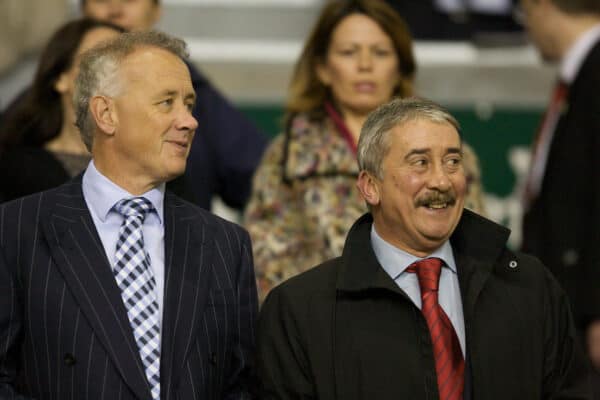
Having grown up during what became an Anfield dynasty, in which one managerial legend was replaced with seeming ease by looking within for his successor, Moores was a traditionalist and, despite his wealth, much closer to the zeitgeist of Liverpool’s working-class fan base than any modern owner could hope to be. The ethos of the club throughout his formative years had been based first and foremost on putting a team on the pitch capable of making the people happy. That meant winning, but in the ’70s and ’80s, it had not required the sort of rampant monetisation witnessed from the ’90s onwards.
There can be no doubt that whatever his shortcomings in terms of commercialisation of the club, Moores steadfastly backed his managers. He did so with cash, but he was also fiercely loyal to them and the boot room tradition of the club.
Indeed, when he somewhat reluctantly disposed of Graeme Souness’ services in 1994, it would be to Roy Evans, an Anfield stalwart, that he would go. In turn, the way in which the club would handle the demise of Evans’ tenure tells you all you need to know about the love Moores had for the club’s traditions and its servants.
The decision to appoint Gerard Houllier alongside Evans as joint manager, rather than simply replacing Roy, was seen as a bold experiment by some, but to many, it owed more to Moores’ deep respect and loyalty for a man who had served the club as a man and boy and who had given his all for the cause.
The media called it the kindest sacking in the history of the game, and when the axe inevitably fell, the chairman would even offer Evans a “job for life” as a director at the club. In a testament to his integrity, Evans would turn down the opportunity to become a “ghost on the wall” and would take his leave.
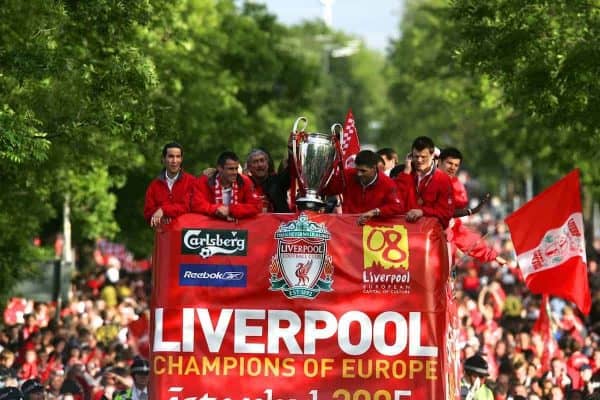
Houllier took full control, and under the ownership of Moores, he would embark on a complete Anfield overhaul. After a decade of meagre fair – the Reds won just two trophies during the 1990s – the Frenchman was about to deliver an embarrassment of riches. The Moores regime had succeeded in bankrolling not just an on-field revolution but was also advancing off it too. Alongside a domestic cup treble in 2001, Liverpool was also modernising their training base at Melwood.
However, it would be on the triumphant open-topped bus tour around the city, following the completion of that historic League Cup, FA Cup and UEFA Cup treble, that Moores’ love for the club and its supporters would come to the fore. The Liverpool chairman had been almost militantly anti-limelight throughout his reign, but he would give a rare interview as the bus weaved its way through the crowds, clearly taken aback by the raw emotion and joy on display, he tearfully spoke into the camera.
“It just makes you want to win more for them,” he would say, beaming with pride.
Chairman, Liverpudlian
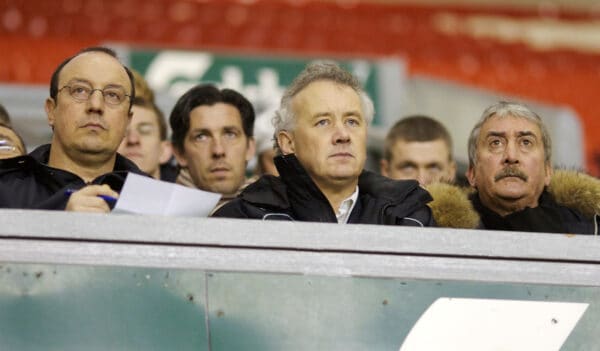
There is no doubting that love and passion for the club had been the driving force behind his ownership, and they always would be. When the Houllier era came to an end, Liverpool turned to Rafa Benitez, and Moores would again witness the kind of communal euphoria most clubs dream of, as Liverpool brought the European Cup home for the first time since 1984. His chairmanship could now rank proudly alongside those of yesteryear. The Moores era had delivered 10 major honours in barely 15 years.
However, he was always aware that at Anfield the most important people were the players, the supporters and the manager. This is perhaps illustrated best by a touching moment between him and Liverpool midfielder Dietmar Hamann after the Reds’ victory over AC Milan in Istanbul. Moores and Hamann were the only smokers at the club, and when the player asked the chairman for a cigarette, the latter looked almost terrified. “But what if Rafa sees us,” he had replied. Hamman would have to remind him that he did own the club.
For all the joy and elation, Moores was becoming increasingly cognisant of the fact that even his riches could not compete with the super-wealthy individuals like Chelsea‘s Roman Abramovich who were changing the landscape of the game. This was thrown into stark relief when the club almost lost Steven Gerrard, the man who had played such a pivotal role in Turkey, in the summer of 2005.
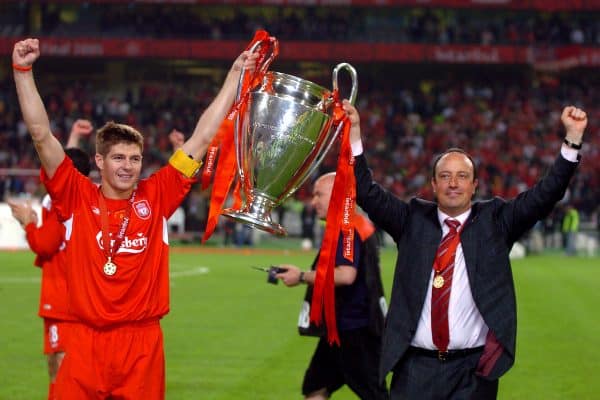
Gerrard, who had been courted at Stamford Bridge for months now, had told the waiting media in the aftermath of the European Cup final, “how can I leave after a night like that.” To the listening Moores and Parry, his word was enough and instead of placing a contract in front of the Reds’ captain there and then, they chose to let the dust settle on the celebrations before deciding to act. Gerrard would interpret their slowness to contact his agent as a sign that they wanted to cash in on him, and Liverpool came desperately close to losing one of their crown jewels.
The Reds were now struggling in the transfer market to compete with the likes of Manchester United and Chelsea, who regularly outpaced and outspent them. Fan forums were awash with supporters critical of the club’s board, and CEO Rick Parry often bore the brunt of their ire. The club was now seen as being constantly “a day late and a dollar short,” on transfer dealings and commercial opportunities. When Liverpool signed Dirk Kuyt from Feyenoord in 2006 for a fee of £9 million, they were only able to do so thanks to a loan from the Moores family.
In the chairman’s mind, there were only two choices open to him, either secure investment or sell up.
Supporters would soon become excited when Dubai International Capital (DIC), owned by Sheikh Mohammed, gained a period of exclusivity as they sought to purchase the club. The promise of the sort of riches that had propelled Chelsea to the summit of the league had Liverpool fans dreaming of star signings and even more silverware. However, those dreams turned into nightmares when the deal collapsed abruptly.
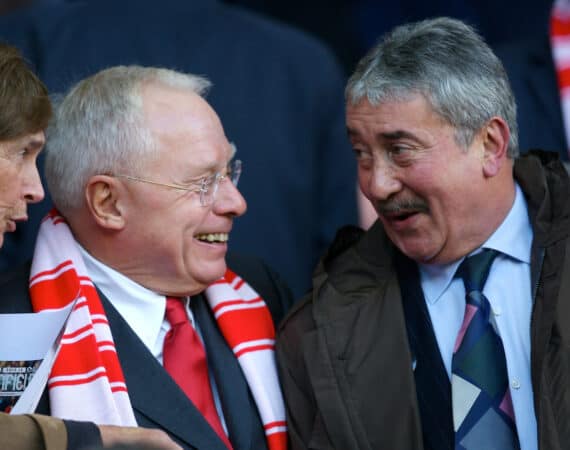
It is said that Moores became concerned at a perceived lack of communication from the would-be purchasers and was increasingly worried that they were only in it for a quick profit and that they would look to move the club on again soon after. When he spectacularly pulled out of the deal, DIC issued a statement claiming the Liverpool chairman had “suffered an aberration of the mind.” Supporters were enraged.
Moores was now under immense pressure both from supporters and, according to him, the club’s other stakeholders, to find a buyer. Tragically, that left the door open for George Gillett and Tom Hicks who bought the club in 2007 for £174.1 million.
He had undeniably been taken in by the pair, claiming in 2007, “I’m handing it over to safe hands. This is not someone coming over to make a quick buck. They are in it for the long term.”
This statement speaks to his desire to pass the club on to someone who would look after it as much as he had tried to. History had shown this to be a disastrous decision, and Moores’ analysis to have been spectacularly wide of the mark, and one he would live to regret.
In 2010, in a letter to the Times, he would express his deep regret at the deal he brokered to sell the club to the two Americans, and would “call upon them now to stand back, accept their limitations as joint owners, acknowledge their role in the club’s current demise, and stand aside, with dignity.”
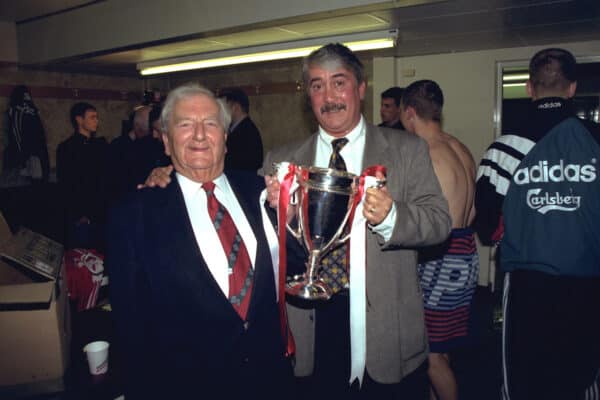
Many have not forgiven him for his role in the collapse of the deal with DIC and the eventual takeover by Hicks and Gillett. Others pointed out that “a simple Google search” could have shown that they were deeply unsuitable as custodians of one of the world’s “most storied franchises,” to use their own US terminology. And so they proved to be. But many of us fell for their bluff, albeit briefly.
As Brian Reade points out in his book Epic Swindle: 44 Months With a Pair of Cowboys, a banner on the Kop had once proclaimed:
Match Ticket £32…
New Anfield £220m…
Rafa Benitez…Priceless
For everything else…
There’s Tom and George
In the end, Moores’ decision to sell the club to Hicks and Gillett was driven by many factors, but I would argue none of those was greed. He may have been naive, a product of a bygone football era ill-equipped for the modern era, and he certainly lacked the resources to deliver the success he and we all craved. However, there should be not a scintilla of doubt in anyone’s mind, in my view, of his enduring love for Liverpool Football Club.
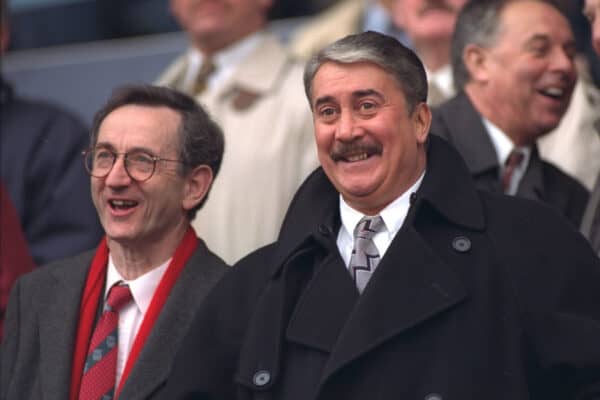
It is pleasing that David was able to return to Anfield for the first time in ten years, and witnessed Jurgen Klopp’s Liverpool beat Everton 5-2 in December 2019. What a moment it must have been for him and his wife, Marge, to join then CEO Peter Moore on the pitch before the game.
There are those who have told me that he will sadly be remembered most for the ultimately disastrous sale of the club to Hicks and Gillett. I hope that’s not the case, and that history will be kinder to a man who brought much success in his 16 years at Anfield, and who undoubtedly loved Liverpool Football Club until his dying day.
Rest in Peace, David Moores, chairman and Liverpudlian.
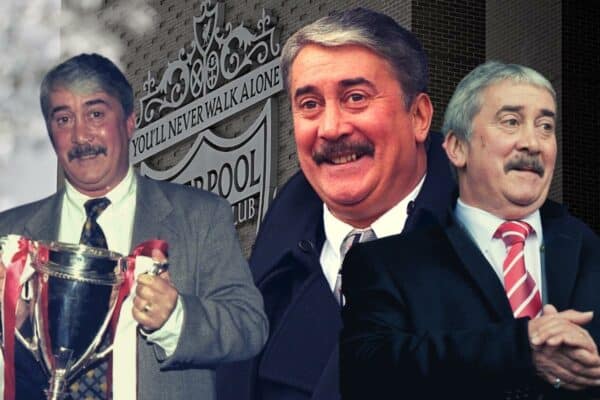





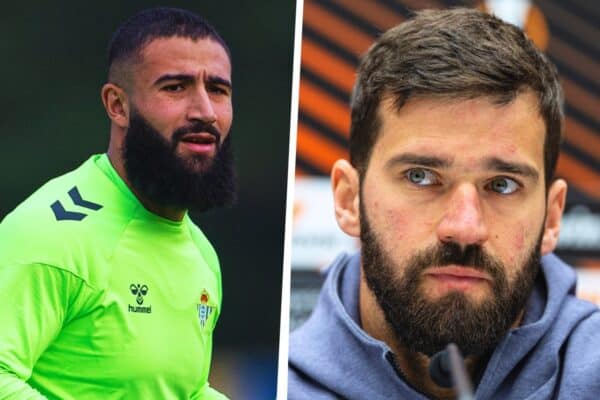

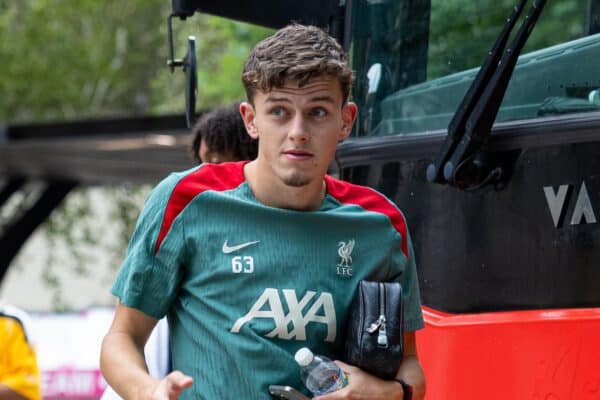
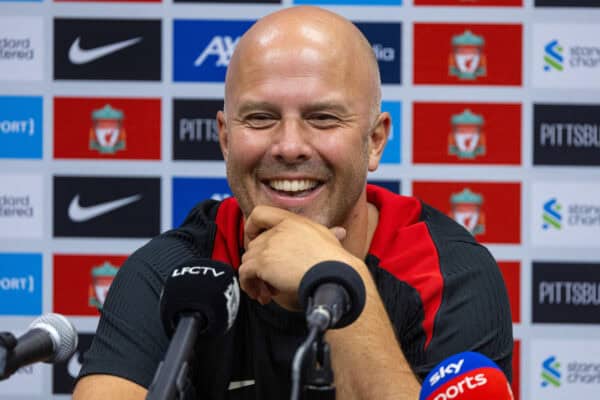
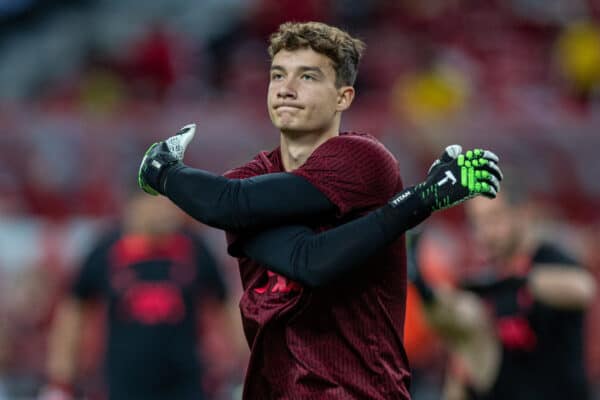
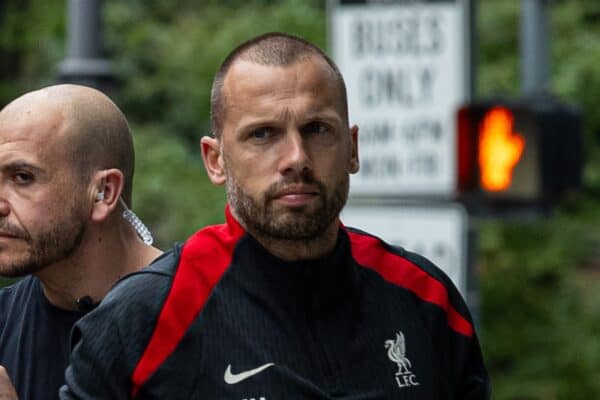
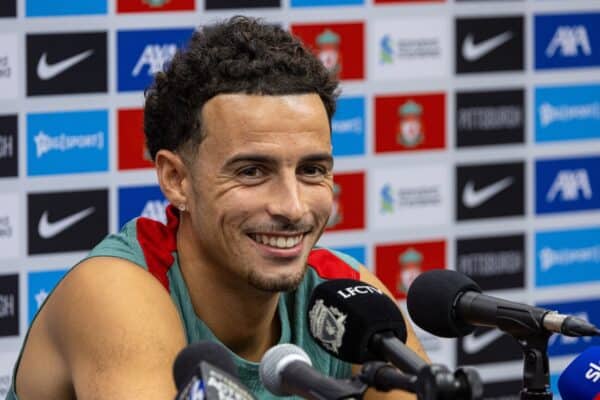
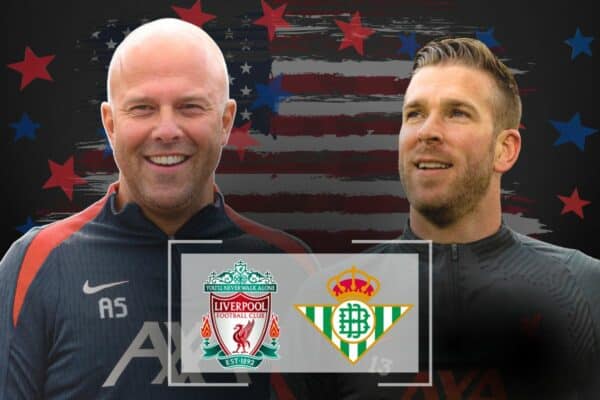





Fan Comments